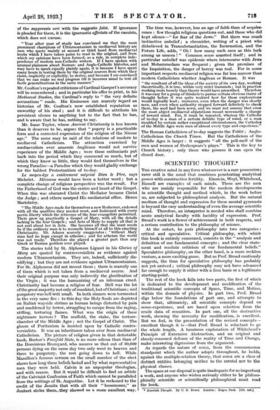SCIENTIFIC THOUGHT.*
Tim creative mind in any form whatsoever is a rare possession; rarer still is the mind that combines penetrating analytical power with constructive fertility. Einstein, Weyl, Whitehead, Russell are examples of such minds. These are the men who are mainly responsible for the modern developments in scientific thought and method which, in the work before us, are subjected to philosophical analysis. But the natural medium of thought and expression for these mental gymnasts is beyond the easy understanding of even the average scientific mind. Therefore, an interpreter is needed who shall combine acute analytical faculty with lucidity of expression. Prof. Broad's work is a flower of achievement in both respects, and a serious contribution to the philosophy of science.
At the outset, he puts philosophy into two categories : critical and speculative. Critical philosophy, with which this book is entirely concerned, consists in the " analysis and definition of our fundamental concepts ; and the clear state- ment and resolute criticism of our fundamental beliefs." Speculative philosophy, on the other hand, is a more reckless venture, a more exciting game. But as Prof. Broad cautiously suggests, the time for speculative philosophy has probably not yet arrived ; critical philosophy may not have advanced far enough to supply it either with a firm basis or a legitimate starting-point.
The rest of the book falls into two parts, the first of which is dedicated to the development and modification of the traditional scientific concepts of Space, Time, and Motion, within the domain of physics. In part two, Prof. Broad digs below the foundations of part one, and attempts to show that, ultimately, all scientific concepts depend on sense-experience, and are based upon selection from the crude data of sensation. In part one, all the destructive work, showing the necessity for modification, is excellent.
But we feel, in the presentation of the revised concepts—
excellent though it is—that Prof. Broad is reluctant to go the whole length. A luminous explanation of Mitelicad's Principle of Extensive Abstraction, and an original and closely-reasoned defence of the reality of Time and Change, make interesting digressions from the argument.
As regards the nature of sensa, from the commonsense standpoint which the author adopts throughout, he holds, against the multiple-relation theory, that sensa are a class of
distinct entities belonging neither to the mental nor to the
physical classes.
The space at our disposal is quite inadequate for so important a work, and anyone who wishes seriously either to be philoso- phically scientific or scientifically philosophical must read the book.
• Seisattilo Thought. By C. D. Broad. Loudon : Kegan Paul. nst.)


















































 Previous page
Previous page